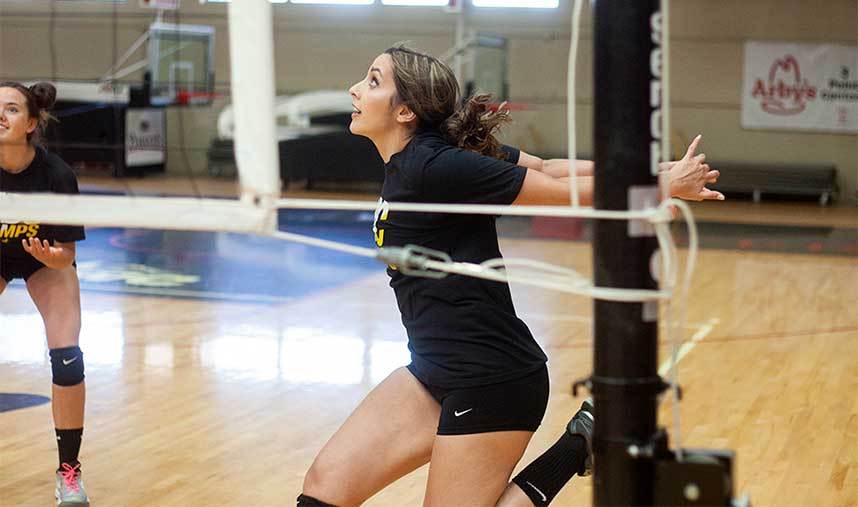January 20, 2023 | Tagged Skills,
How to improve your control on the court

NBC Volleyball has been exploring the four components of Sports Psychology. One of the four components is control.
What is control?
Like many words, control has a troubled history and a difficult past. Why did sports psychology choose this word as one of the four components? Control originated from a medieval method of checking accounts by a duplicate register which was called a control. This word is meant to check the accuracy of, verify, to regulate. In sports psychology, control means command of both the mind and body, physical and mental discipline, and autonomy.
Why does control matter?
Control is a component of successful athletes. Physically, a great volleyball player has complete control and command of the ball; the ball is an extension of the athlete’s will when serving, setting, hitting, or passing to place specifically where an athlete desires. Control also indicates balance and stability. A player can maintain control regardless of difficult events or forces working to destabilize his or her equilibrium.
What are the components of control in sports?
Sports psychologists measure not only physical control but also mental and emotional control. Many novice athletes forget that training the mind is equal to if not more important than training the body because our thoughts determine our emotions and our actions. Inexperienced players let their emotions rule the day. If they do not want to push hard, they give up or they push too hard when their body is telling them to take a break.
Why does mental control matter?
This quote by Andrew Hamilton says it best, “When physical skills are evenly matched, it is often the competitor with the strongest mental approach, who can control his or her mind before and during events, who wins.”
A Big Mental Mistake in Sports Psychology
One of the biggest mistakes athletes make in mental control is the lack of discipline in regulating thoughts around performance. As the body starts to prepare for a big game or event, the body begins to flood with endorphins in anticipation. An undiscerning or unaware athlete can experience this flood of elevation in the attention system and label this experience as uncomfortable, negative, or bad. They begin to have adverse feelings about the rush. Mindset makes the biggest difference and can turn this epinephrine rush into their best friend or their worst enemy. The difference is in the thinking. Those who used this surge of power and energy as a positive and good friend, had optimal performance results. Those who experienced the surge as painful, uncomfortable, problematic, and an enemy, had much worse performance results.
Second Big Mental Mistake in Sports Psychology
Focus on and frustration about what is uncontrollable instead of managing what we can control is another huge mental mistake. There are certain things outside of our control in sports and in life. Frustration, anger, depression, and sorrow can override our experiences as athletes when we focus on the wrong things.
Controllables vs Uncontrollables
Make sure your energy is not wasted on what you cannot control
- Controllable Uncontrollable
- Focus Bad call
- Attitude Rude opponents
- Attention Playing time
- Effort Coaching bias
- Preparation Injuries (to a certain extent)
- Discipline Other people’s attitude or effort
- Mindset Unexpected hardships
Make a list of what you can and cannot control. Redirect any energy spent on what you cannot control and put it toward what you can control.
Stay out of negative or “stinkin thinkin” and choose positive and grateful thoughts. You can problem-solve and find innovative solutions when your mind is full of gratitude. Pessimism and frustration limit our ability to find creative solutions.
Volleyball Control
TCOB—Take Care of the Ball is a huge aspect of NBC Volleyball. This means dedication to the discipline of making the ball an extension of yourself. This disciplined effort must be intensive and should be practiced most days of the week.
Balance—Control in sports is equated to balance. Balance is defined as the ability to neutralize forces that disrupt equilibrium.
Just like a toddler must have balance to walk, balance is fundamental.
Stability---athletic ability. Stability is the level a person can retain balance while experiencing factors that disturb balance. The greater your dynamic stability the greater your success. In volleyball stability allows someone to quickly get under a ball for a better dig or pass, and stability allows consistency in form when serving, or best approach technique for hitting.
About NBC Volleyball
NBC Volleyball began in 1979 and is one of the most established overnight volleyball camps in the country. Athletes work on improving their talent, mindset, and overall understanding of the game. Camps are overnight or day depending on location and demographics.
Find out more at www.nbccamps.com/volleyball